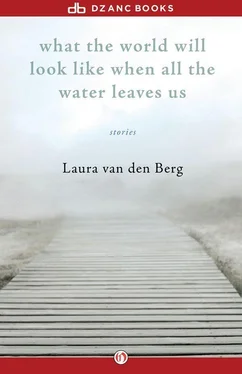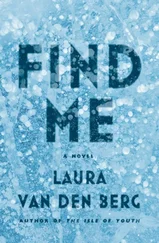“I think your husband was afraid of the wrong things,” Leon said.
“Really? Was he?” She crossed legs. “When I was down there, for a second I thought everything he’d feared was coming to pass. That he’d been in his right mind after all.”
“But he was always looking to the outside, finding danger in shadows.” Leon tapped his chest. “What about what’s in here?”
Juliana suddenly felt restless and wanted to be off the train, in the open air. She asked Leon how much longer until they reached Marseille.
“Less than an hour,” he said, pointing to the river they were passing. Juliana looked out the window in time to see the little blue and white boats tied to the banks, the paint gleaming in the sunlight, cheerful hostages.

After they arrived at the Marseille train station, she followed Leon into a parking lot, where he stopped in front of the Smart Car he’d rented and unlocked the doors. Near the end of the train ride, he’d mentioned wanting to drop in on a friend before going to the beach and she had agreed, wondering if they would be visiting someone from his youth.
Juliana sank into the passenger seat and opened her satchel to check her cell phone, noticing a new voicemail. When she listened to the message, no one spoke, although she thought she heard the faint static of breath, a low sound that deepened and shifted like wind. A wrong number, she told herself, although she couldn’t help but imagine the caller might be Cole, phoning for something that couldn’t be explained in a voicemail, and felt a flush spread down her neck when she realized the missed call was listed as an unknown number. Or, she wondered, could the caller be Fredrick. Her number was in the school directory, so it was possible. Was he angry that she’d spoken to his mother? What would he have said if she’d answered? It was too much for her, these pointless speculations. She turned off her phone and tossed her bag into the backseat.
“A good day for swimming,” Leon said. He drove with one hand on the bottom of the steering wheel. The sun was full and shone brightly against his face. “After our visit, we’ll go to the beach.” He turned onto a two-lane road. “It’s only a little farther south.”
She hadn’t been to a beach since her college years, always favoring the enclosure of cities. When the weather turned warm in Paris, she joined the groups who lay on the concrete banks of the Seine in their shorts and bathing suits or went to the enormous fountain near the Palais De Chaillot, where she could dangle her legs into the water and feel the spray from the fountainhead. She liked the anonymity of being deep in a crowd, of temporarily forgetting all the days that had come before. But a real beach, with pale sand and deep waters. She looked at Leon, cupping her hand over her eyes to block the sun. “I think that’ll be nice,” she said.
She leaned forward in her seat and watched the scenery, struck by the disparity of the terrain. She felt moisture in the air, yet the ground was dry and hard. One moment, the plants and trees were gray and arid, then they rounded a corner and were met with lush color. The land was flat for miles and then blossomed into impressive rises. They passed a vineyard, rows of low green plants, and an overgrown field with a dilapidated farmhouse in the center. In the distance, she saw the purple silhouettes of mountains.
She noticed a man walking down the road. He resembled, from afar, her husband, the same lanky build. He appeared to be wearing a pinstriped coat and carrying a briefcase, walking with a swiftness that seemed out of place in the country. But as they passed him, she realized his face, his soft features, looked nothing like Cole’s; the briefcase was actually a toolbox, the man’s jacket frayed and dusty. She recalled the early days of Cole’s disappearance, scrambling to catch up to a man in the metro station, darting across the street to follow someone who had (she thought) his walk, staring through the window of a restaurant at a diner who held a spoon in the same way. She had grown used to these tricks of the mind.
Although they had lived on the outskirts of Boston and hadn’t been directly impacted by the attacks in New York, Cole had fallen into a dark period that lasted until Christmas, attending every meeting on port and transit security that was open to the public and trying to push his way into some that weren’t, detouring to avoid the busiest bridges, working from home as much as possible to limit his time in the Financial District. But it had passed and she never imagined a resurgence. After all, the media was flooded with stories about people suffering from post-traumatic stress; his behavior had seemed understandable. It wasn’t until the Paris riots that she realized how much he’d changed, as though some dark seed buried inside him had found the ideal conditions for growth. And after he left, she was forced to recognize how she’d changed as well, her determined cheerfulness and willful ignorance, her ability to read the newspaper and then push the unpleasantness from her mind (how typical, how bourgeoisie, how very American, she thought now), as though the world wasn’t shifting very much at all, as though everything wasn’t disintegrating beneath them.
They passed an old couple standing in a pasture, rows of stone houses with pink and yellow shutters, and then a field of red poppies, the petals delicate and thin as tracing paper. She wondered if someone had planted them or if they had taken root naturally. She asked Leon to pull over and he did. She got out of the car and walked into the field. He rolled down the window and watched her.
She stepped carefully to avoid flattening the poppies. The soil was cracked and brown. It seemed miraculous that such brilliant color had emerged from this parched square of land. She bent over and pulled a flower from the ground. A breeze passed over the field, bending the stems of the plants. She crushed the petals in her fist, the little slivers of red pushing between her fingers like silk. The poppy was soft and damp in her hand. From the center of the field, it felt like she was surrounded by a thousand tiny faces.
“Hey,” Leon shouted from the car. When she looked over, he was pantomiming a camera. He brought the imaginary camera to his face and made a clicking noise. “I’ll call it still life with poppies.”
She smiled and waved, then dropped the petals and wiped her palm on her jeans.
“You don’t see flowers like this in the north,” he said when she returned to the passenger seat. He started the car and pulled into the road. “Lavender,” he added. “That’s another thing that grows like wild over here.”
“Question.” She touched the red streak on her palm. “What do you think Fredrick is trying to say with his pictures?”
“That the world is too much for him.” They turned onto a dirt road. White dust rose around the car. “Children say it all the time in different ways. The privilege is lost with age.”
“If you were going to draw a self-portrait, what would it look like?”
He drummed his fingers against the steering wheel. “A bunch of lines maybe. Like a ball of string. Or maybe a big flat shadow.”
“Do you remember the Henri Cross painting at the d’Orsay? The one that looks like it’s made of a million little dots?”
He nodded.
“When I saw it, I felt like if I blew hard enough on the canvas, all those specks of paint would scatter.” She tried to rub the red from her skin, but it barely lightened. “I would make something like that.”
They parked in front of a squat cobblestone house and got out of the car. Leon walked to the front door and knocked. An elderly woman answered. She was small, her skin freckled and creased. She wore a white linen dress with large pockets on the front and a black scarf wrapped around her head, revealing only a curve of silver along the hairline. Her eyes were small and dark.
Читать дальше













